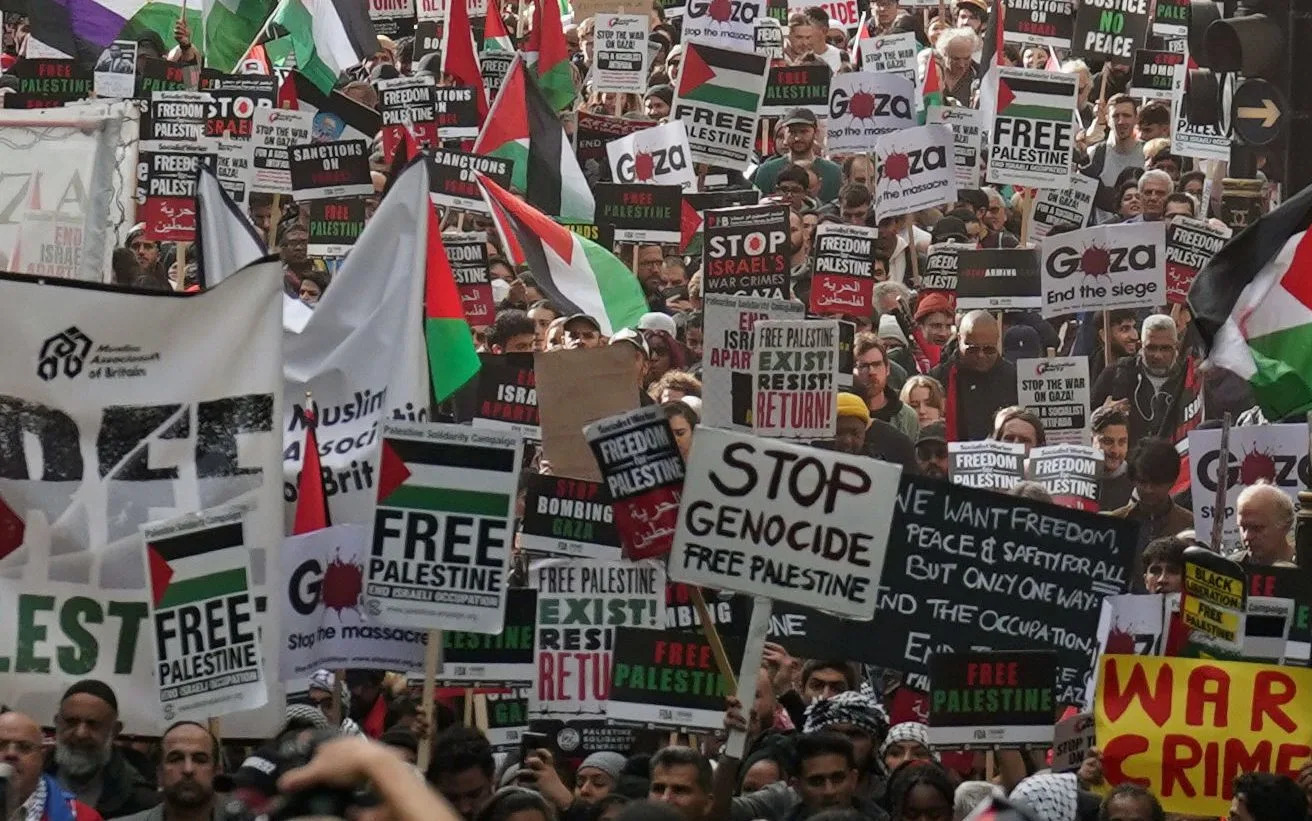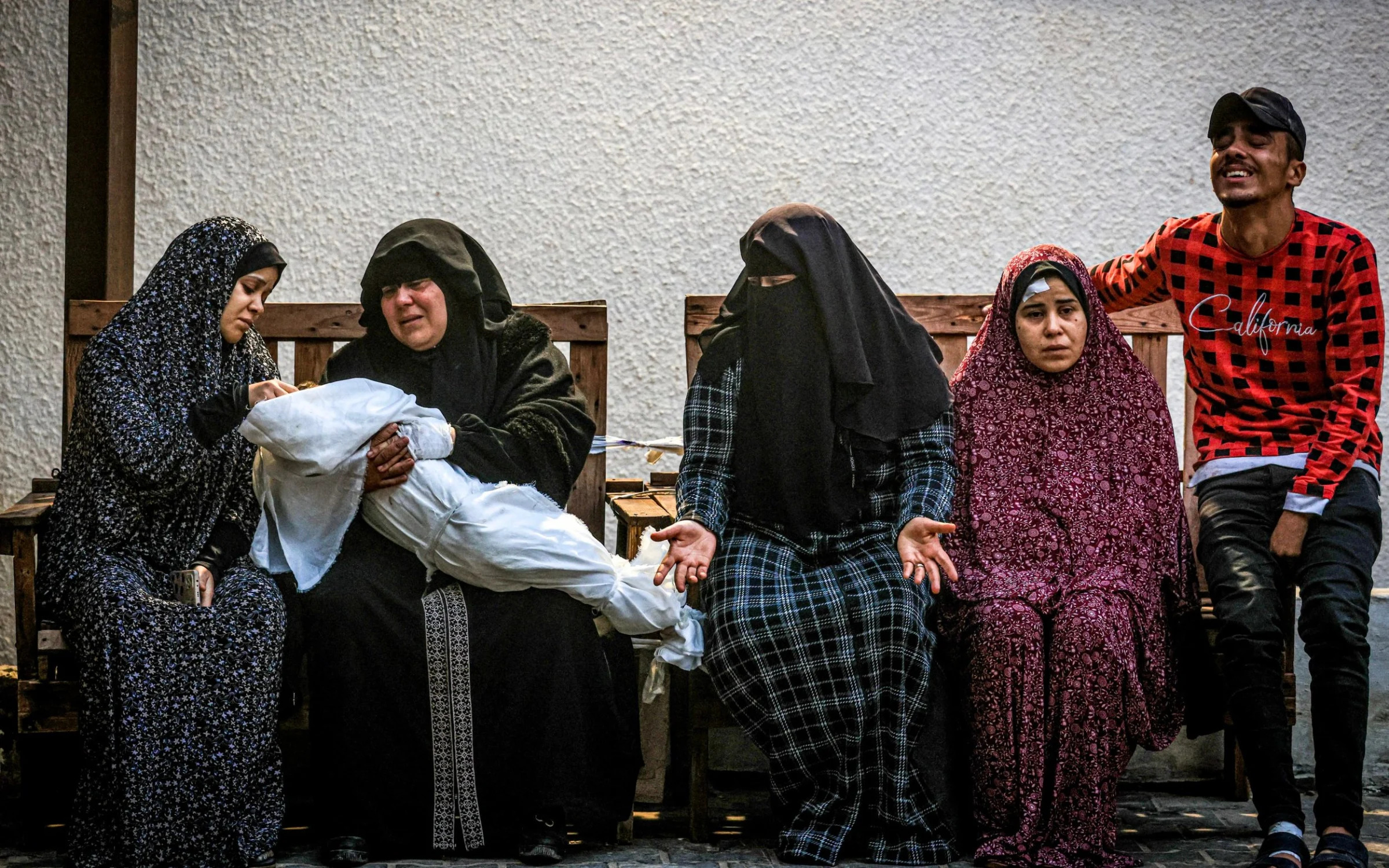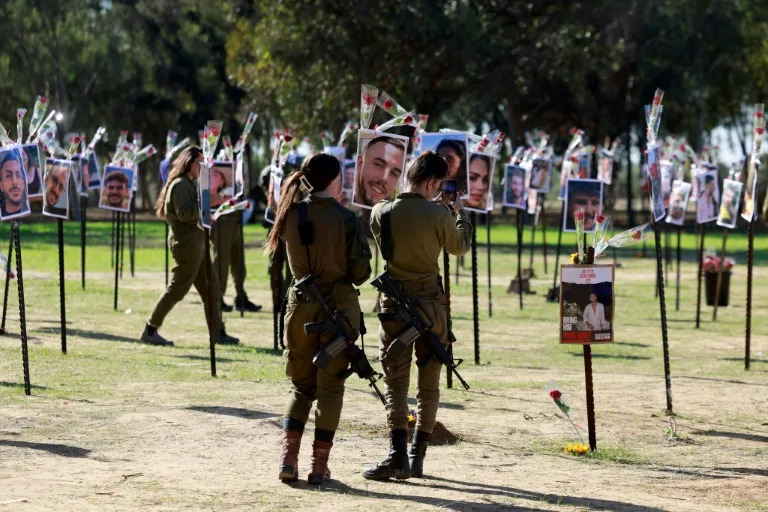If you want to see what brainwashing really looks like, it’s worth checking out the videos currently circulating on social media of Gazan parents dressing up their babies in Hamas “merch”.
Protesters at a pro-Palestine march in London -
In one, a father is holding a toddler in his arms dressed in a green Hamas overall and matching headband.
The young dad is asked: “If you will lose your beloved, cute daughter, if she decides she wants to be a suicide bomber, will you be happy about that?” He replies: “Yes, I will help her and encourage her,” adding: “We are all Hamas.”
Then there’s the mother who describes her 17-month-old daughter as “Hamas from birth,” adding: “Her blood is green.”
Another woman is asked: “Do you think we will see more Farj-5 rockets hitting Tel Aviv?” to which she replies: “I wish, in the name of Allah.”
As with the radicalisation that took place during the invasion of Iraq and Afghanistan, it is all too easy to dismiss terrorist sympathisers and glorifiers as a danger only to themselves and their children. But news of a Hamas plot to kill Jews in Europe brings the threat much closer to home.
Seven suspected Hamas operatives were arrested in Germany, Denmark and the Netherlands, with the Danish prime minister describing the plot as “as serious as it gets”. According to German prosecutors, the Hamas operatives were under orders to bring a cache of weapons from an undisclosed location in Europe to Berlin to attack Jewish institutions.
The suspects were allegedly planning attacks across Europe, officials said, without giving further details. Israeli officials have suggested the arrests are linked to a single, cross-border European terror plot.
While there was no immediate suggestion of a British link to this Hamas plot, the threat to British Jews is very real. It extends beyond the placards and anti-Semitic slogans we have witnessed on our streets already, and puts us all in danger.
Historically, Hamas hasn’t shown much of an interest in carrying out terrorist attacks outside of Israel. But if this position is now changing, how many sympathisers in Europe, and indeed Britain, would act on its call to arms?
The Community Security Trust (CST) provides security advice and protection to synagogues, Jewish schools and other sites in Britain. As its spokesman pointed out, such a shift in policy to “carry out attacks on Jewish communities outside the region, in line with Iran and Hezbollah ... would be extremely concerning. It represents a significant shift in the threat posed to Jewish communities. There is a big concern if Hamas HQ is ordering Hamas people in Europe to carry out an attack.”
If recent protests are anything to go by, then we may be uniquely vulnerable to this terrorist threat. If calls for “jihad” are taken literally, with young men believing they should fight a holy war on our streets, then we may face the worst terrorist threat since al-Qaeda or Isis.
Sir Alex Younger, the former head of MI6, told BBC Radio 4’s Today programme on Thursday that the intelligence community will be fearful of a glidepath towards radicalisation in the UK. “It is a dangerous moment but let me be clear, the danger is within,” he said. “The world’s always been a dangerous place, the thing that keeps us safe is faith in our alliances, faith in our values, faith in the things that make our country strong.
“Where we wobble on that, yes it puts us in serious danger.”
Admitting the West had approached recent years with a degree of hubris, he added: “Speaking domestically, my understanding is while we don’t see a serious uptick now, what really worries my former colleagues is a scale of radicalisation as a result of what is happening in the Middle East which is pretty unparalleled.”
In the past, we saw radicalisation as something that happened in the shadows. Now, however, it appears to be taking place before our very eyes on mainstream social media and, as we have witnessed since the October 7 attacks, on the streets of our capital.
While I am not for one minute suggesting that all pro-Palestinian marchers are wannabe terrorists, or even Hamas supporters, we simply cannot turn a blind eye to the Jew hate being spouted by the anti-Semites in their midst. If you ever needed proof that such fundamentalists have no respect for Western values, just look at the brazen way in which they wear their celebration of medieval hate like a badge of honour.
They are seemingly so beguiled by the murderers, rapists and hostage takers of Hamas that they actually consider them freedom fighters. It hasn’t once crossed their hoodwinked minds that the people the Palestinians really need to be freed from is their terrorist, Jew-hating overlords – not Israel. And that makes them very dangerous indeed.
They may be the extreme end of the wedge but also consider the frightening ease with which so-called “peaceful” protesters have been willing to chant “from the river to the sea”, without actually knowing which river or sea they are referring to or how offensive that phrase is to Jews.
The slur that Israel is a “genocidal” state has been repeated so often that it has become normalised. Indeed, we have now reached the abhorrent point of casualised anti-Semitism that primary school children have been happily declaring that they “hate all Jews” in playground rows, according to the CST. Amanda Bomsztyk, its northern regional director, said other young people were being “abused on the streets” including with “Nazi salutes” in harassment that is “the worst we’ve ever seen”.
Even among highly educated university staff and students, Jew hate appears to have become second nature. Institutions like University College London, the first in Britain to admit Jews in the 19th century, have felt the need to write letters of support for Jewish students. Elsewhere, we have witnessed young adults tearing down the posters of Hamas victims.
Combined with this heady mix of virtue-signalling ignorance are the useful idiots on social media, unwittingly egging on Hamas, taking their propaganda as gospel. It is all a recipe for disaster.
If we cannot do anything to stop imams preaching in Britain’s mosques from a Hamas-sympathetic script, and if we cannot ban Islamist groups who chant for jihad, then how on earth are we going to blunt the threat of radicalisation leading to violence on our streets?
Palestinian support for Hamas jumps since Oct 7 despite high cost of war.
A Palestinian woman holds the body of a baby at Najar hospital in Rafah.
Palestinian support for Hamas has risen since the Oct 7 attack despite the brutal war with Israel, according to a new poll.
Some 44 per cent of respondents in the West Bank said they backed the terror group, up from just 12 per cent in September, the poll by the Palestinian Center for Policy and Survey Research found (PCPSR).
The rise in support was less pronounced in the Gaza Strip, where more than 18,000 people have been killed in months of fighting according to the Hamas-run health ministry.
42 per cent of Gazan respondents said they supported Hamas, a rise of only 4 per cent from three months ago.
Support for armed struggle has also grown by 10 per cent since the outbreak of the conflict, according to the survey of 1,231 people in the West Bank and Gaza. Polling was conducted from Nov 22 to Dec 2.
The poll’s authors said: “It is worth noting support for Hamas usually rises temporarily during or immediately after a war, and then returns to the previous level several months after the end of the war.”
‘Not one good day under Hamas’
Overall, the majority of Palestinians do not support Hamas, the poll found.
“Life under Hamas is harsh and they installed many restrictions,” Hiba Jamal, 29, told the Telegraph from Khan Younis, a city in southern Gaza under attack by the Israeli military.
“High taxes, crazy fees, chaotic flow of goods through terminals, corruption, and lack of freedoms – no freedom of speech, no political freedoms,” said Ms Jamal. “I cannot think of one good day under their government.”
Most Palestinians said Hamas’ decision to launch the Oct 7 attack was correct. The figure was 82 per cent in the West Bank and 57 per cent in Gaza.
A majority of those surveyed also believe that the Oct 7 attack was a response to ongoing Israeli attacks against Palestinians and their holy places with the aim of releasing Palestinian prisoners.
More than 90 per cent of respondents say they do not believe that Hamas committed the atrocities documented in online videos from that day, such as killing women and children in their homes.
Facing devastating bombardments and Israeli military assaults, Gazans were half as likely to think Hamas will emerge victorious as residents of the West Bank, who put the chance as high as 70 per cent.
One third of Gazans instead said that they believed Israel would win the war, compared to 1 per cent in the West Bank.
Mahmoud Abbas deeply unpopular
Yemen was viewed as Palestine’s staunchest ally, with 80 per cent support following a series of Houthi rocket attacks on ships trading with Israel. Saudi Arabia was the least favoured, with just 5 per cent support. Only one per cent backed the US approach, with Joe Biden so far broadly supporting the actions of the Israeli military.
The poll also found that 88 per cent of respondents want Mahmoud Abbas, leader of the West Bank-based Palestinian Authority (PA), to resign.
Although widespread disapproval of Mr Abbas amongst Palestinians has been reflected in previous polls, the US has continued to call for the PA to eventually assume control of Gaza, in addition to the West Bank, as a transitional move toward possible statehood.
Thursday marked the third continuous day of Israeli military raids in Jenin, a city in the West Bank.
Since war broke out, Israel has arrested more than 3,000 Palestinians in the West Bank, according to estimates from the United Nations. More than 250 people have also been killed in the territory.
According to the PCPSR poll, some 64 per cent of Gazan respondents have family members who have been killed or wounded in the Israeli military operation.
President Biden warns Israel amid civilian casualties in Gaza
President Biden urges restraint as Israel continues its war against Hamas, despite international calls for a ceasefire. Also, several people with ties to Hamas are arrested in Europe, suspected of planning terror attacks against Jewish people. All that and all that matters in today’s Eye Opener.
Israel social security data reveals true picture of Oct 7 deaths.
Israeli soldiers pay their respects to those killed or taken hostage by Hamas at the Supernova music festival .
A more precise picture of Hamas's October 7 attack on Israel has emerged from social security data, confirming the unprecedented scale of the violence but also challenging some initial testimonies.
The final death toll from the attack is now thought to be 695 Israeli civilians, including 36 children, as well as 373 security forces and 71 foreigners, giving a total of 1,139.
This excludes five people, among them four Israelis, still listed as missing by the prime minister's office.
The violence began when armed men from the Palestinian Islamist movement broke through the militarised border with Gaza on Shabbat, the last day of the Jewish holiday of Sukkot.
Under the cover of thousands of rockets fired from Gaza, they killed indiscriminately in streets, houses, kibbutz communities and at a rave music festival.
It took more than three days of heavy fighting for the Israeli army to regain control, and left the country deeply traumatised by violence unseen since the country's formation in 1948.
Police are still working to assess the scale of the sexual violence that was reported alongside the killings.
On October 14, Israeli authorities announced a preliminary toll of more than 1,400 people killed by "Hamas terrorists".
On November 10, the foreign ministry published an "updated estimate", saying the number "murdered in cold blood" was around 1,200 people, without further details.
With many of the bodies mutilated or burned beyond recognition -- including entire families in their homes -- it has taken forensic doctors weeks to identify them all.
Israel has vowed to destroy Hamas in response to the attack. Its air and ground offensive has killed more than 18,700 people, mostly women and children, according to figures from the health ministry in the Hamas-run Gaza Strip, and left much of the territory in ruins.
- Social security figures -
The identities and ages of civilian victims are available via Bituah Leumi, Israel's social security agency.
Its website lists 695 people killed during the attack, with names and the circumstances of their deaths.
Among them are 36 children, including 20 under 15 years old and 10 killed by rockets.
The youngest victim was 10-month-old Mila Cohen, shot and killed at Kibbutz Beeri.
An entire family, including three children aged between two and six, were killed in their home at Kibbutz Nir Oz.
Elsewhere, two brothers aged five and eight were shot dead in their car with their parents.
A five-year-old boy was killed in the street by a rocket.
The data gives a clear picture of the scale of the atrocities at the Supernova music festival in Reim where 364 people were killed.
But it also invalidates some statements by Israeli authorities in the days following the attack.
In particular, a claim made on October 10 on the government's official X (formerly Twitter) account spoke of "40 babies murdered" at Kfar Aza kibbutz, based on a report by i24NEWS channel.
Questioned by AFP the following day, Israel's foreign ministry, which runs the X account, said it could not "confirm any number at this stage".
According to Bituah Leumi, 46 civilians were killed in Kfar Aza, the youngest 14 years old.
Another testimony called into question was that on October 27 by Colonel Golan Vach, head of the army's search and rescue unit, who told a group of journalists, including one from AFP, that he "personally" transported "a decapitated baby" found in the arms of his mother in the Beeri kibbutz.
According to Bituah Leumi, only one baby was killed in Beeri: the 10-month-old Mila Cohen, whose mother survived.
Army spokespersons did not respond to queries by AFP.
- Trauma and 'misinterpretation' -
The extreme nature of the violence can make it hard for responders to be accurate in their testimonies, said members of Zaka, an emergency response NGO that helped collect victims' bodies.
"When we find bodies that are burned or in a state of decomposition, we can easily be mistaken and think the body is a child's," said Haim Otmazgin, a Zaka leader.
One Zaka volunteer had, for example, spoken on October 11 of 20 children with their "hands tied in the back, shot and burned" in Beeri, but ultimately only nine children died there.
"Our volunteers were confronted with traumatic scenes and sometimes misinterpreted what they saw," said Otmazgin.
There were also 71 foreign victims on October 7, mostly Thai workers.
And in the fighting to regain control of southern Israel, 58 police, 10 members of internal security service Shin Bet, and 305 soldiers were killed, including several dozen unarmed soldiers guarding the border with Gaza.
Israel counts both soldiers killed in action and off-duty soldiers in its military casualties, and so these figures include, for example, some who died at the Supernova festival or while visiting their family in the south.
The Bituah Leumi data does not distinguish between those killed by Hamas and civilians killed by Israeli forces in the fighting to retake control of southern Israel, an operation in which the army used shells and rockets on inhabited areas, according to testimonies collected by AFP and Israeli media.
It is also unclear how many Palestinian militants were killed on Israeli soil.
The army said on October 10 that it had found "around 1,500 bodies" of attackers, without giving further details. The army and defence ministry did not respond to queries from AFP on this topic.
In an interview with Al Jazeera, Hamas second-in-command Saleh al-Aruri said "around 1,200 fighters" took part in the October 7 attack.
Israel also faces the ongoing trauma of some 250 hostages who were dragged back to Gaza in the attack, according to Israeli authorities.
Since then, 110 have been released, most during a one-week truce in November, and eight bodies of hostages have been returned.
Israel says Hamas still holds 132 hostages, including 19 presumed dead.





